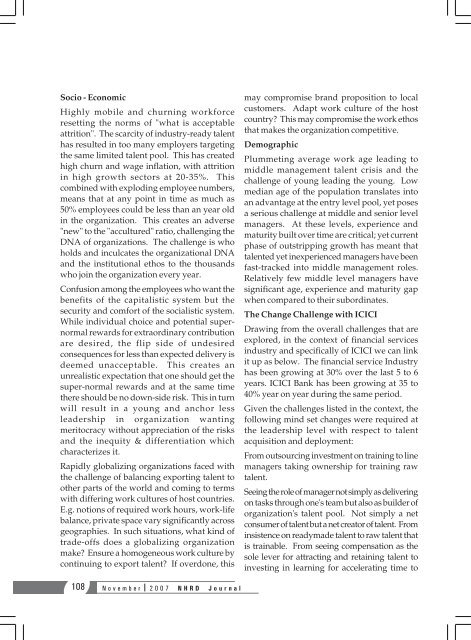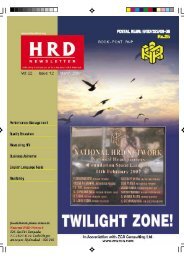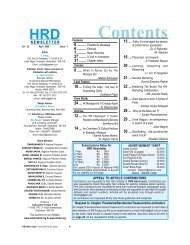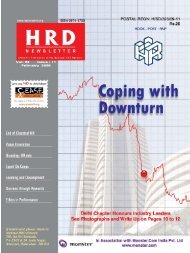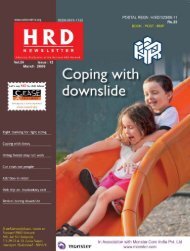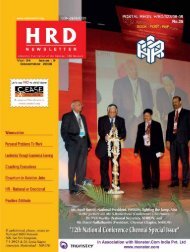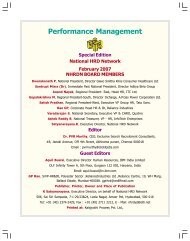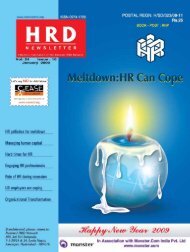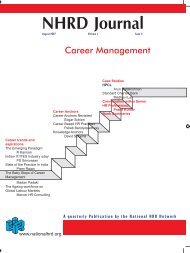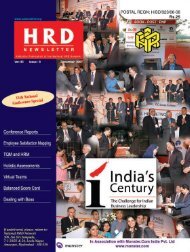NHRD Journal - National HRD Network
NHRD Journal - National HRD Network
NHRD Journal - National HRD Network
You also want an ePaper? Increase the reach of your titles
YUMPU automatically turns print PDFs into web optimized ePapers that Google loves.
Socio - Economic<br />
Highly mobile and churning workforce<br />
resetting the norms of "what is acceptable<br />
attrition". The scarcity of industry-ready talent<br />
has resulted in too many employers targeting<br />
the same limited talent pool. This has created<br />
high churn and wage inflation, with attrition<br />
in high growth sectors at 20-35%. This<br />
combined with exploding employee numbers,<br />
means that at any point in time as much as<br />
50% employees could be less than an year old<br />
in the organization. This creates an adverse<br />
"new" to the "accultured" ratio, challenging the<br />
DNA of organizations. The challenge is who<br />
holds and inculcates the organizational DNA<br />
and the institutional ethos to the thousands<br />
who join the organization every year.<br />
Confusion among the employees who want the<br />
benefits of the capitalistic system but the<br />
security and comfort of the socialistic system.<br />
While individual choice and potential supernormal<br />
rewards for extraordinary contribution<br />
are desired, the flip side of undesired<br />
consequences for less than expected delivery is<br />
deemed unacceptable. This creates an<br />
unrealistic expectation that one should get the<br />
super-normal rewards and at the same time<br />
there should be no down-side risk. This in turn<br />
will result in a young and anchor less<br />
leadership in organization wanting<br />
meritocracy without appreciation of the risks<br />
and the inequity & differentiation which<br />
characterizes it.<br />
Rapidly globalizing organizations faced with<br />
the challenge of balancing exporting talent to<br />
other parts of the world and coming to terms<br />
with differing work cultures of host countries.<br />
E.g. notions of required work hours, work-life<br />
balance, private space vary significantly across<br />
geographies. In such situations, what kind of<br />
trade-offs does a globalizing organization<br />
make? Ensure a homogeneous work culture by<br />
continuing to export talent? If overdone, this<br />
may compromise brand proposition to local<br />
customers. Adapt work culture of the host<br />
country? This may compromise the work ethos<br />
that makes the organization competitive.<br />
Demographic<br />
Plummeting average work age leading to<br />
middle management talent crisis and the<br />
challenge of young leading the young. Low<br />
median age of the population translates into<br />
an advantage at the entry level pool, yet poses<br />
a serious challenge at middle and senior level<br />
managers. At these levels, experience and<br />
maturity built over time are critical; yet current<br />
phase of outstripping growth has meant that<br />
talented yet inexperienced managers have been<br />
fast-tracked into middle management roles.<br />
Relatively few middle level managers have<br />
significant age, experience and maturity gap<br />
when compared to their subordinates.<br />
The Change Challenge with ICICI<br />
Drawing from the overall challenges that are<br />
explored, in the context of financial services<br />
industry and specifically of ICICI we can link<br />
it up as below. The financial service Industry<br />
has been growing at 30% over the last 5 to 6<br />
years. ICICI Bank has been growing at 35 to<br />
40% year on year during the same period.<br />
Given the challenges listed in the context, the<br />
following mind set changes were required at<br />
the leadership level with respect to talent<br />
acquisition and deployment:<br />
From outsourcing investment on training to line<br />
managers taking ownership for training raw<br />
talent.<br />
Seeing the role of manager not simply as delivering<br />
on tasks through one's team but also as builder of<br />
organization's talent pool. Not simply a net<br />
consumer of talent but a net creator of talent. From<br />
insistence on readymade talent to raw talent that<br />
is trainable. From seeing compensation as the<br />
sole lever for attracting and retaining talent to<br />
investing in learning for accelerating time to<br />
108<br />
November 2007 <strong>N<strong>HRD</strong></strong> <strong>Journal</strong>


